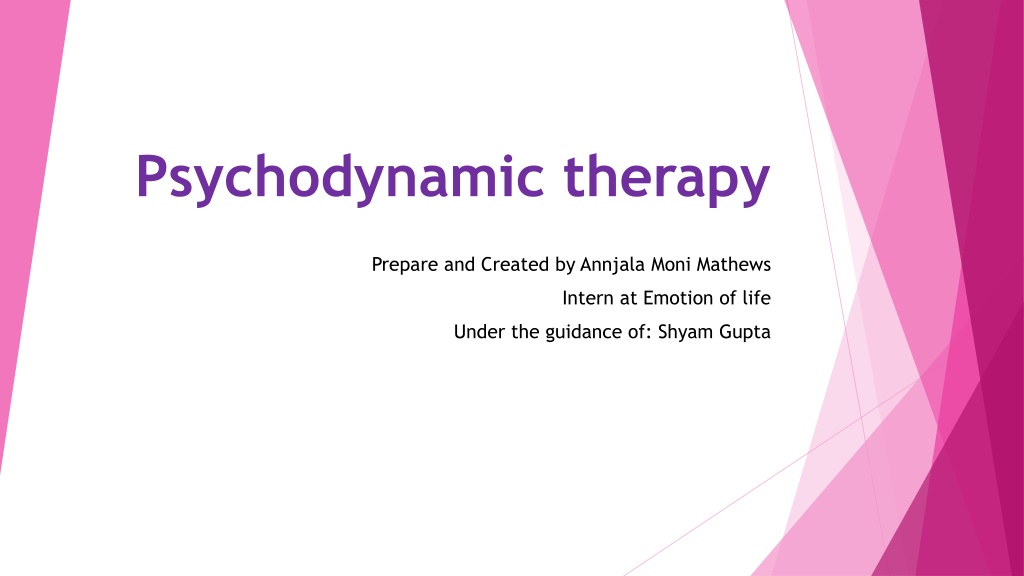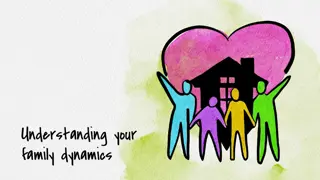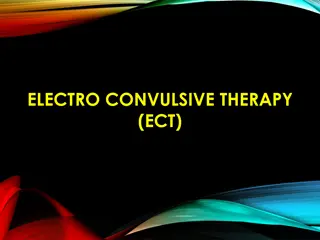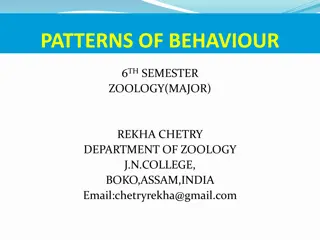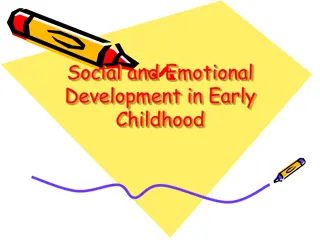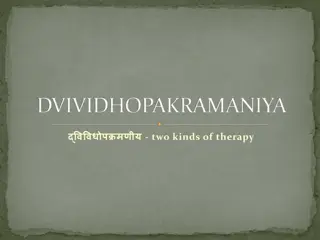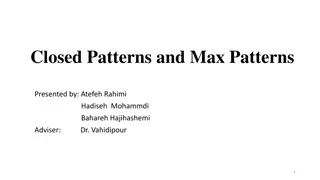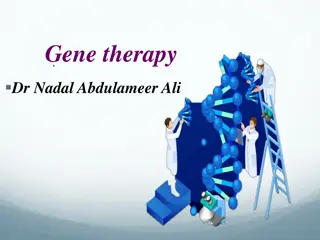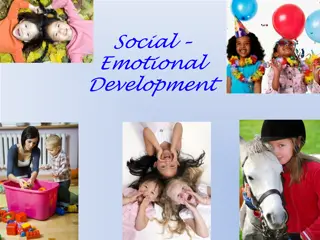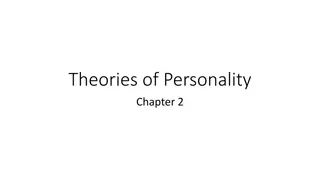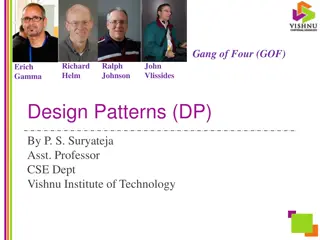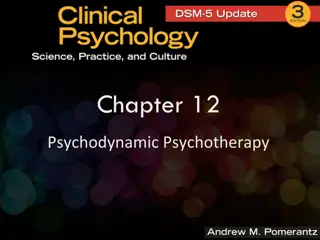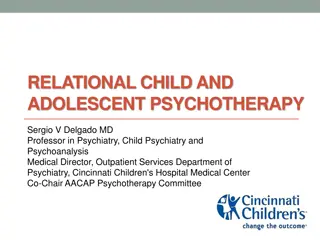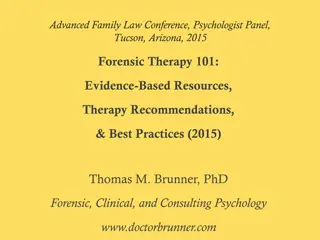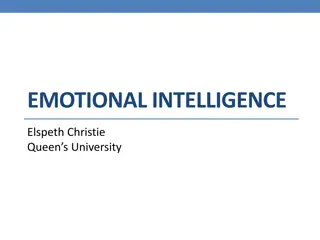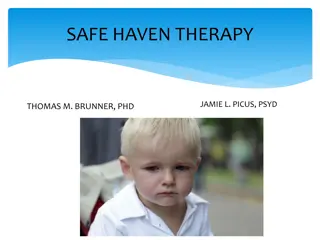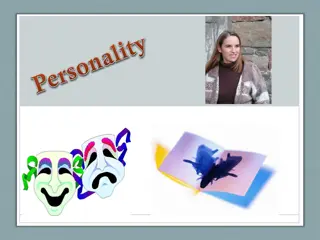Understanding Psychodynamic Therapy: Unveiling Emotional Patterns and Self-Insight
Delve into the world of psychodynamic therapy, where mental and emotional processes take precedence over behavior. Rooted in Freudian theory, this therapeutic approach aims to uncover unconscious patterns, childhood influences, and internal conflicts to foster self-awareness and personal growth. Through a collaborative therapeutic relationship, clients explore their emotions, thoughts, and beliefs to gain valuable insights into their present selves.
Download Presentation

Please find below an Image/Link to download the presentation.
The content on the website is provided AS IS for your information and personal use only. It may not be sold, licensed, or shared on other websites without obtaining consent from the author. Download presentation by click this link. If you encounter any issues during the download, it is possible that the publisher has removed the file from their server.
E N D
Presentation Transcript
Psychodynamic therapy Prepare and Created by Annjala Moni Mathews Intern at Emotion of life Under the guidance of: Shyam Gupta
Introduction to psychodynamic therapy Psychodynamic therapy involves the interpretation of mental and emotional processes rather than focusing on behavior. Psychodynamic therapists attempt to help clients find patterns in their emotions, thoughts, and beliefs in order to gain insight into their current self.
Psychodynamic therapy has its root on psychodynamic theory. Sigmund Freud s name comes to mind when we hear this theory. He proposed that human mind is composed of three components: 1. The id, which consists of instinct and forms the basis of the unconscious mind; 2. The superego, or moral component that houses our beliefs of right and wrong; 3. The ego, the mediator between the animal instinct of the id and the enlightened moral thought of the superego
Freud also said about the three levels of mind such as: Conscious- is where the current thoughts are involved, The pre-conscious- is where the previous or stored information's are there which can be easily brought to mind The unconscious- is where those unpleasant memories which the person don t want to think of is being suppressed.
Even though psychodynamic approached developed a lot it still has some resemblance with Freud s ideas: The unconscious mind is one of the most powerful drivers of human behavior and emotion; No behavior is without cause all behavior is determined Childhood experiences imposes a significant influence on thoughts, emotions, and behavior as an adult; Important conflicts during childhood development shape our overall personality as adults
Role of psychodynamic approach The therapist encourages the client to talk about the emotions they feel and also helps the client to understand and identify repeated patterns in their thoughts, etc. The therapist helps the client to talk about their childhood experiences, that is., their past. The therapist observes how the client interacts within the therapeutic relationship and add their own insight into the client s relationship habits to the discussion.
Goals of psychodynamic therapy The goals of psychodynamic therapy are : (1) enhance the client s self-awareness and (2) foster understanding of the client s thoughts, feelings, and beliefs in relation to their past experiences, especially his or her experiences as a child.
Types of psychodynamic therapy Brief psychodynamic therapy- This type of therapy occurs over a few sessions or even just one session. This is usually helpful for clients who has some specific problem and needs to overcome that. It has been helpful for situations like: Physical abuse case Accident (traffic, physical injury, etc.); Act of terrorism; Acute psychological disturbances (like anxiety or depression); Obsessive Compulsive Disorder Management Traumatic family event (discovery of a secret, divorce, etc.).
Psychodynamic Family Therapy- Along with the therapist the other people who are involved in this are two adults in a romantic relationships, parents, siblings, etc. This is usually a relatively longer and looks at the chronic problems in the family. Psychodynamic Art / Music Therapy- This therapy involves the expression of feelings and emotions through art or music. Using art or music the therapist or client forms a better form of understanding and this is helpful for those who are shy and are finding it difficult to express their ideas.
Tools and techniques in psychodynamic therapy Psychodynamic Diagnostic Manual (PDM)- Those therapist who follow psychodynamic therapy uses this manual in order to diagnose and to treat clients. Rorschach Inkblots- Clients will be shown ink blot cards where they will interpret those cards and the therapist is able to understand inner ongoing thoughts & cognitive structure, and other psychopathology related with client life.
Freudian Slip- These slips refer to instances when the client mean to say one thing but accidentally let slip another, specifically when deeper meaning can be attributed to this slip. Free Association- This is where the client is allowed to talk freely. Dream Analysis- Dream analysis is undertaken by discussing the client s dreams in detail. The therapist will guide the client through this discussion, asking questions and prodding the client to remember and describe the dream in as much detail as possible.
Psychodynamic therapy is suited for: Anxiety Panic disorders Post-traumatic stress disorder Personality disorders, such as borderline personality disorder Stress-related physical ailments Physical symptoms that lack a physical basis Persistent feelings of isolation and loneliness Prolonged sadness Sexual difficulties
Some of the benefits or other goals of psychodynamic therapy Increasing self esteem Developing the ability to have more satisfying relationships Increasing confidence in personal abilities Increasing understanding of self and others Recognition and toleration of a wider range of emotions Gradually becoming more able to face issues and difficulties Benefits that endure and increase with time
Call for any further detail:9368503416/7678694626 Email us your query : info@emotionoflife.com Visit out website: www.emotionoflife.com
